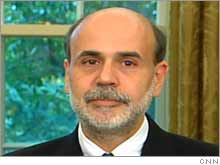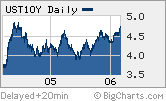|
Beware the hikes of March
Wall Street is spooked by the possibility of more interest rate increases this year. What's an investor to do?
NEW YORK (CNNMoney.com) - Interest rates. They're like a bad song that gets stuck in your head after you hear it on the radio -- and try as they might, investors just can't stop thinking about them. The Federal Reserve is widely expected to boost rates for a fifteenth consecutive time, to 4.75 percent, when it meets later this month. And many market observers are predicting a not-so-sweet sixteenth rate hike when the nation's central bank meets again in May. Since the Dow Jones industrial average hit a four-year high nearly two weeks ago, stocks have fallen on investor worries about rising rates. "One of the main drivers right now for the market is this worry about interest rates," said Brian Stine, investment strategist with Allegiant Asset Management Co. in Cleveland. Investors typically don't like rising rates, even though they are usually a signal of a growing economy, because they boost borrowing costs for corporations, which can erode profits. For this reason, investors often won't bid up stocks in a rising-rate environment. "Corporate earnings may slow down and with the Fed poised to raise rates at least one if not two more times, a lot of equity investors are cautious and waiting to see how first-quarter earnings will be," said John Norris, chief economist and senior fund manager with Morgan Asset Management in Birmingham, Ala. "That could be a reason why stocks are taking it on the chin." Treasury bond yields have jumped as well. The yield on the 10-year Treasury note has run up to about 4.75 percent in recent days, the highest since June 2004. Rising yields mean investors worried about rising rates are selling bonds. Bond prices and yields move in opposite directions. And it's not just fear about rising rates in the U.S. either. It's a global concern. "There has been volatility about statements by not only members of our Fed but foreign central bankers as well," Stine added, referring to recent comments from members of the European Central Bank and Bank of Japan about the possibility that those banks will raise rates in the near future. The ECB has already raised rates and is signaling more to come. And the Bank of Japan is widely expected to end its long policy of keeping rates near zero when its policy-makers meet later this week. Reason for caution...
What does it all mean for investors the next few months? Barry Ritholtz, president of Ritholtz Capital Management, a New York-based hedge fund, said now is the time to start cutting back on stocks that have underperformed because the stock market could get worse before it gets better. He thinks inflation is a legitimate concern and that the Fed is likely to keep raising rates to combat pricing pressures. As such, he expects long-term bond yields to keep heading higher as well. "What's happening with long-term yields is the direct result of underlying inflation in the system. Investors are finally starting to realize that inflation has real consequences," Ritholtz said. "It behooves investors to become defensive in their portfolios in the event of a major correction. That's a realistic possibility." Jeffrey Saut, chief investment strategist for Raymond James, also said investors need to be cautious. He argues that the Fed, under the leadership of new chairman Ben Bernanke, is likely to keep raising rates for the foreseeable future and this will spook Wall Street. So he thinks investors could afford to wait until later this year for signs that the Fed is truly done before jumping back into stocks. "The markets may be set up for a buying spot in the summer or early fall but before we get there you're going to hear cries that Bernanke is overdoing the tightening and we'll get a correction of more than just a few percent," said Saut. Morgan Asset's Norris agreed that patience would be wise for investors right now, especially since there are other investment options that make sense, such as parking cash in money market funds, where yields have been rising. "If you're an individual investor, you can get paid a decent amount for cash. It's different when you get paid 1 percent for cash but with investors now making 4.3 to 4.4 percent in money market funds maybe it makes sense to just sit back and wait," Norris said. ...or a prime buying opportunity?
Still, others think that investors who ride out what could be a couple of rocky months eventually will be rewarded. Allegiant's Stine said that the market need not worry too much about interest rates since it still seems apparent that the Fed will stop raising rates sometime this year. The only question is when. "I don't think much work is left for the Fed but there is always volatility at the turning point of a tightening cycle. But with volatility comes opportunity," said Stine. "Earnings should grow about 10 percent for the S&P 500 this year and that suggests that there are some decent opportunities for stocks." Along those lines, Jack Ablin, chief investment officer with Harris Private Bank, said that investors should be looking at stocks that are expected to generate decent growth this year since many trade at reasonable prices based on their earnings prospects. "I don't view the market as risky or dangerous even in spite of more Fed tightening," Ablin said. "We have enough value in U.S. and international growth stocks. What's holding stocks back right now is uncertainty about interest rates, not valuation." And even Saut at Raymond James said investors shouldn't completely ignore stocks. The trick he said, is not to make bets on the overall market but to try and identify good quality companies that are attractively valued. "You can make money in this market. It's a mistake to have an overly bullish view and it's a mistake to have an overly pessimistic view. You have to buy the right stocks in the right sectors," he said. ------------------------------ Bush's choices for the Fed may be more likely to overreach on rate hikes. Full story. For more about the Fed and interest rates, click here.
For a look at the bond markets, click here. |
|





